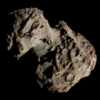C/1848 P1 (Petersen)
| Discovery | |
|---|---|
| Discovered by | Adolph C. Petersen |
| Discovery site | Altona, Germany |
| Discovery date | 8 August 1848 |
| Designations | |
| 1848 I[1] | |
| Orbital characteristics[2] | |
| Epoch | 8 September 1848 (JD 2396279.0453) |
| Observation arc | 19 days |
| Number of observations | 30 |
| Perihelion | 0.319 AU |
| Eccentricity | ~1.000 |
| Inclination | 95.594° |
| 213.650° | |
| Argument of periapsis | 260.948° |
| Last perihelion | 8 September 1848 |
| Comet total magnitude (M1) | 8.1 |
Comet Petersen, also known as C/1848 P1 by modern nomenclature, is a parabolic comet that was seen during the month of August 1848. It is first of three comets discovered by German astronomer, Adolph C. Petersen.[3]
Observational history
Adolph C. Petersen discovered his first of two comets of the year as a "small, bright, well-defined object" in the constellation Auriga on 7 August 1848.[a] Further observations in the following days proved to be increasingly difficult as it dropped steadily deeper into the morning twilight.[3]
It was last observed on 27 August 1848, though it was predicted that it had reached perihelion by the next month.[3] Recalculations of its orbit together with C/1848 U1 (another comet also discovered by Petersen) in 2014 show both comets have parabolic and hyperbolic trajectories respectively, suggesting their possible origin in the Oort cloud.[4]
References
Notes
Citations
- ^ "Comet Names and Designations". International Comet Quarterly. Retrieved 16 December 2024.
- ^ "C/1848 P1 (Petersen) – JPL Small-Body Database Lookup". ssd.jpl.nasa.gov. Jet Propulsion Laboratory. Retrieved 16 December 2024.
- ^ a b c d G. W. Kronk (2003). Cometography: A Catalog of Comets. Vol. 2: 1800–1899. Cambridge University Press. pp. 184–185. ISBN 978-0-521-58505-7.
- ^ R. L. Branham, Jr. (2014). "Orbits of comets C/1848 P1 (Petersen) and C/1848 U1 (Petersen)". Planetary and Space Science. 103: 286–290. Bibcode:2014P&SS..103..286B. doi:10.1016/j.pss.2014.08.014. hdl:11336/31928.
External links
- C/1848 P1 at the JPL Small-Body Database


